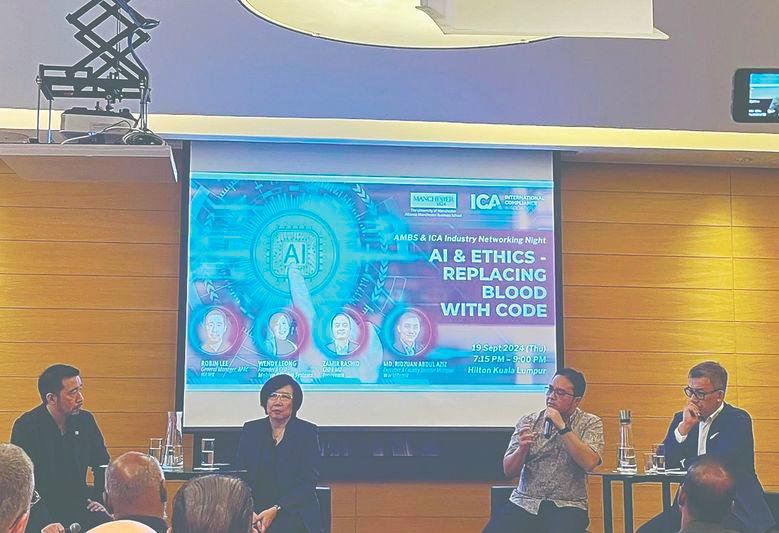Focusing on the ethical challenges of Artificial Intelligence (AI) and part of University of Manchester ’s (UOM) Bicentenary Events Series which celebrates 200 years of learning, innovation, and research, the discussion highlighted the growing importance of ethical considerations as AI rapidly integrates into sectors like finance and banking, both globally and in Malaysia.
Moderated by Robin Lee, General Manager of HAWK Asia-Pacific, the event opened with a keynote address, ‘AI and Ethics — Building Responsible AI’, followed by a panel discussion on ‘Navigating Ethical Dilemmas in AI’. Topics of discussion included the need for ethical frameworks in AI deployment, identifying the balance between innovation and risk, and the importance of ensuring responsible AI use.
The panelists included Mohammad Ridzuan Abdul Aziz, Executive & Country Director for Malaysia and Indonesia at WorldRemit, a direct online fund transfer platform.
Also on the panel were UoM alumni Wendy Leong, Founder & CEO of Mobiva and Veriva Systems, companies specialising in compliance management solutions for banking and financial institutions.
Also included was Zamir Rashid, CEO & Managing Director of Innoveam, which provides 3D technology solutions for industrial applications across Southeast Asia. Both brought unique perspectives on the ethical challenges of AI within their respective industries.
Ridzuan discussed AI’s growing role in finance, emphasising the need for ethical considerations, especially in areas like investment and insurance. He noted that limited-memory AI is already in use, from Perodua’s autonomous vehicles to banking functions like credit analysis.
As digital banks integrate AI into broader ecosystems, Ridzuan stressed the importance of explainable algorithms to maintain trust. He also highlighted the need for Malaysians to continually improve their digital literacy to adapt to these changes.
Zamir provided a brief overview of the complexities of deploying AI, and re-emphasised the importance of transparent and ethical AI practices in industrial applications like oil and gas. Also highlighted in his points were the challenges tied to data, algorithms, and the training needed for responsible digital transformation.
While AI is starting to create value for companies, he noted that its application still lags behind in Malaysia. Zamir urged business leaders to better understand these technologies, create demand for digital transformation, and explore synthetic data modelling to improve predictive capabilities across industries.
Leong shared insights from her experience with AI in enterprise mobility and emergency management solutions, outlining steps her company took to eliminate biases in AI algorithms. She highlighted her work in developing generative AI to enhance workflow automation and leverage data from community leaders for real-time insights.
She emphasised the need for hybrid skills across various sectors, noting that in Malaysia we need to introduce hybrid skills with critical thinking and design theory with emphasis on language and creativity, generative AI must be deployed in local institutions to drive future progress.
“AI is transforming industries globally, and if we are to utilise it to its fullest potential, it is absolutely imperative that its ethical dimensions are taken into consideration as well.
As established in our other programmes, we believe in developing Digital Sustainable Leaders, and this event was an important step toward honing this goal,” said Lim Bee Ing, Regional Director UoMSEA.
Lim May May, Managing Director of ICA, said: “At ICA, we believe the intersection of AI and compliance presents immense opportunities to reshape industries, but only if we build trust through ethical practices.”
Organisations must embrace AI’s innovative capabilities while committing to strong ethical frameworks. By fostering transparency and responsibility in AI deployment, we can ensure that innovation and integrity go hand in hand. This event has been a crucial platform for sparking these vital conversations.”
As UOM celebrates its 200-year legacy, this discussion exemplifies a continuous commitment to its broader educational goals innovation, leadership, and global influence. To this end, UoMSEA is currently running its Global MBA workshops in Kuala Lumpur and is preparing for the launch of its upcoming MSc in Financial Management programme in Malaysia, further expanding its reach and accessibility on a global level.
To find out more, please visit www.manchester.edu.sg









